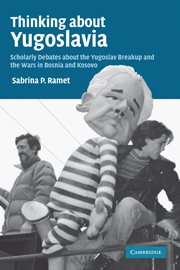 Thinking about Yugoslavia
Thinking about Yugoslavia Book contents
- Frontmatter
- Contents
- Preface
- List of books discussed
- Glossary
- 1 Debates about the war
- 2 The collapse of East European communism
- 3 The roots of the Yugoslav collapse
- 4 Who's to blame, and for what? Rival accounts of the war
- 5 Memoirs and autobiographies
- 6 The scourge of nationalism and the quest for harmony
- 7 Milošević's place in history
- 8 Dilemmas in post-Dayton Bosnia
- 9 Crisis in Kosovo/a (with Angelo Georgakis)
- 10 Debates about intervention
- 11 Lands and peoples: Bosnia, Croatia, Slovenia, Serbia
- 12 Southern republics: Macedonia and Montenegro in contemporary history
- 13 Conclusion: controversies, methodological disputes, and suggested reading
- Index
- References
4 - Who's to blame, and for what? Rival accounts of the war
Published online by Cambridge University Press: 22 September 2009
- Frontmatter
- Contents
- Preface
- List of books discussed
- Glossary
- 1 Debates about the war
- 2 The collapse of East European communism
- 3 The roots of the Yugoslav collapse
- 4 Who's to blame, and for what? Rival accounts of the war
- 5 Memoirs and autobiographies
- 6 The scourge of nationalism and the quest for harmony
- 7 Milošević's place in history
- 8 Dilemmas in post-Dayton Bosnia
- 9 Crisis in Kosovo/a (with Angelo Georgakis)
- 10 Debates about intervention
- 11 Lands and peoples: Bosnia, Croatia, Slovenia, Serbia
- 12 Southern republics: Macedonia and Montenegro in contemporary history
- 13 Conclusion: controversies, methodological disputes, and suggested reading
- Index
- References
Summary
History – so little understood in some quarters – is a slippery art. History, even contemporary history, is not journalism, it is not akin to a stenographic record, it is not, by any stretch of the imagination, comprehensive. Depending on what is remembered and how it is recounted, the identity of a people, a society's mores, and even some of the society's political options at any moment may be affected, shaped, even constrained. There is no such thing as a history without an interpretation; if there were such a thing, it would resemble a scrapbook of randomly collected bits of information, without any effort having been made to assess the relative importance of one fact as opposed to another. A historian confronts a welter of different sources, some of them offering alternative accounts of the facts, and must take responsibility for doing the best job s/he can in terms of bringing together those facts which (1) are reliably confirmed and (2) are worth reporting (no one today cares what the price of nails in Zagreb was in 1926). Historians often talk of the importance of getting at the best sources, including archival sources, and there is no doubt but that this is important. However, a historian's most important virtue is integrity, for it is integrity which is the best assurance of the ‘reliability’ of the interpretations offered.
- Type
- Chapter
- Information
- Thinking about YugoslaviaScholarly Debates about the Yugoslav Breakup and the Wars in Bosnia and Kosovo, pp. 76 - 107Publisher: Cambridge University PressPrint publication year: 2005


